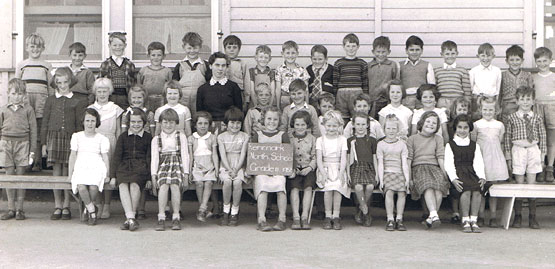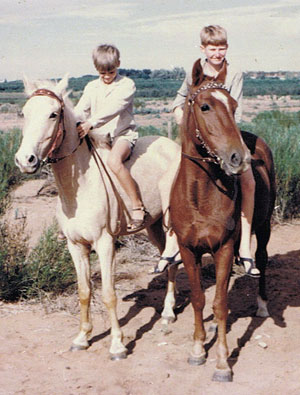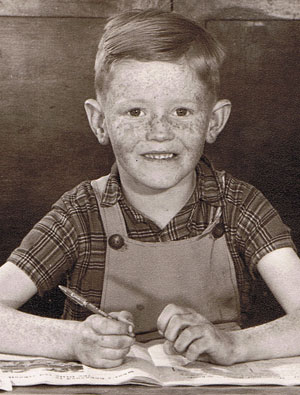I’ll Bring the Elephant Tomorrow For Sure

Renmark North School, Grade 2, 1956. South Australia. Photo provided by Bonnie Poulter
[This week, I'd like to share a story excerpted from my recent LogiCON keynote. The speech is a bit on the personal side, as I'm sure you'll be able to tell. Much of it has to do with my own childhood. —Daniel]
My father has always been a wonderful storyteller.
 When my brothers and I were little, my Dad would tuck us into our beds, “bristle” our cheeks with his stubble, and tell us stories or poems. We loved Australian bush poetry (we must have heard “Mulga Bill's Bicycle” and “The Man From Ironbark” a thousand times), but our favorites were tales of his own childhood, growing up poor on the edge of the desert in South Australia. His Tom Sawyer-like childhood sounded magical to us: racing horses bareback over red sand, plucking oranges from the trees of his family's tiny fruit farm, catching yabbies in the hidden backwaters of the River Murray.
When my brothers and I were little, my Dad would tuck us into our beds, “bristle” our cheeks with his stubble, and tell us stories or poems. We loved Australian bush poetry (we must have heard “Mulga Bill's Bicycle” and “The Man From Ironbark” a thousand times), but our favorites were tales of his own childhood, growing up poor on the edge of the desert in South Australia. His Tom Sawyer-like childhood sounded magical to us: racing horses bareback over red sand, plucking oranges from the trees of his family's tiny fruit farm, catching yabbies in the hidden backwaters of the River Murray.
Many of these stories had a subversive edge to them, I realize now. Many were direct lessons in skepticism.
I'd like to tell you one of those, as I remember it 30 years later — exactly the same way I recently told it to my own son.
The Elephant Story

My Dad as a scruffy school kid. 1956
Once upon a time, your Grandpa Farmer was a little boy like you. He had a mother and a father, and six brothers and sisters. They were very poor, and did not have the toys and treats that I had growing up, or that you have today. They trapped rabbits for food for their family (which was bad for the rabbits, but good for Australia). Every day, the kids would run barefoot over the burning sand to their schoolhouse, uphill both ways.
One day, my Dad's mother came home with a rare and special treat — something almost too precious to believe.
It was a chocolate bar! The children gathered around in amazement. Their mouths watered. Their eyes sparkled. As their mother unwrapped the foil, the chocolate seemed to glow with deliciousness. It seemed to sing.
Carefully, carefully, their mother broke the bar into seven equal pieces: two sweet, small squares for each child. These she put into the children's lunches.
That day my father ran to school. He could hardly believe his good fortune. All day he dreamed of the chocolate. It felt to him like lunchtime would never come.
But lunchtime did come, in the fullness of time. Trembling, my father took out his small chocolatey treasure….
“Watchagotthere, mate? Candy?” It was one of the bigger kids.
“Yes,” said my father. “It's a special treat.”
“Can I have some?”
My father held the chocolate a little closer. “I'm sorry,” he said. “I don't have very much.”
The other boy considered this. “What about a trade?” he asked.
“I don't know,” my father replied. “What have you got?”
“I'll tell you what,” the older boy offered. “If you give me your chocolate, I'll let you have a ride on my elephant.” He beamed with his own generosity.
“I… wait, what? You don't really have an elephant. Do you?”
“Sure we do!” assured the big kid. “My father got him from a circus. We use him on the farm for plowing and stuff. He's stronger than a team of bullocks, but he's tame as a kitten! Also, he can jump over a tree. We ride him all the time. I could bring him to school with me tomorrow.”
Now, my father hardly knew what to do. He loved chocolate, but what kid could pass up a chance to ride on top of a real, live elephant? Swiftly the deal was made. They shook hands — and then the bigger boy woofed up that chocolate in two seconds flat.
That night my father could hardly sleep. He raced through his breakfast the next day, and practically flew across the sand to his school. He turned breathless into the schoolyard, and saw… no elephant. Puzzled, he went and found the older boy.
“Sorry about that!” said the boy. “My folks needed the elephant home on the farm today. I'll bring him tomorrow.”
The next day my father was twice as excited, and ran to school twice as fast. But again, no elephant.
“Yes, sorry,” the older boy told him. “He needed a washing today. Big job to wash an elephant! I'll bring him tomorrow.”
But the next day, the elephant was missing once more.
“Sore foot today! I'll bring the elephant tomorrow for sure….”
At this point, I stopped and asked my own little boy, “What do you suppose happened next? Did Grandpa Farmer ever get his ride on the elephant?”
My son frowned, his eyes deadly serious. “No,” he said, his voice tense with the knowledge of injustice. “That other boy was lying.”

Like Daniel Loxton’s work? Read more in the pages of Skeptic magazine. Subscribe today in print or digitally!

Well, circuses might not sell elephants to farmers, but they’d let them take them to their farms often enough. You shouldn’t have to look too hard for old family photos of people on the farm with the visiting elephant. I’ll have to see if I have one somewhere.
Why? Publicity, maybe, and free elephant feed.
Where’s the punchline?
So a Polack visits London for the first time.
A guy comes up to him, points to Big Ben, and says, “I’ll sell you that big clock over there.”
The Polack pays him half his money, and the guy says, “Stay here, I’ll go get a ladder,” runs off, and doesn’t return.
Next day, another guy offers to sell Big Ben. The Polack pays him the rest of his money, and the guy says, “Stay here, I’ll go get a ladder.”
But the Polack protests, “Oh no you don’t! I won’t be fooled again. YOU stay here, and I’LL get the ladder.”
A Frenchman sees a Polack pushing the Eiffel Tower, and asks what he’s doing.
The Polack explains, “The tower’s owner said I could have it for free! I’m pushing it home.”
-Oh yeah? How far have you moved it already?
-Really far. I can’t even see the suitcase I left behind.
A stereotype walks into a bar and does something stupid. And then this other stereotype says, “Hey, why are you doing that?” And the first stereotype explains why, but the reason makes no sense! And the second stereotype laughs – as do we, the insensitive listeners.
You see it is funny because they are not us!
People like you always tells jokes like that.
I noticed that our local Joe’s Crab Shack has a permanent sign that says “Free crab tomorrow!”…I can’t wait!Yum.
That was a protest sign.
I hope your father got to ride an elephant one day.
Great idea to teach a reality lesson with a bedtime story. I do that sometimes, but my grandson likes the condensed Edgar Allen Poe stories best.
I love the diversity of the authors on this blog. We have Shermer covering the academic aspects, Novella and Prothero for the hardcore science, Mark Edward for the cerebral, and Loxton for.. umm.. story time?
You’re a super guy Daniel, but I found this piece just slightly less interesting than drying paint.
Bedtime stories are supposed to put you to sleep.
“You’re a super guy Daniel, but I found this piece just slightly less interesting than drying paint.”
Robo,
Do you ever think before you type something? Do you ever think about how it will look to others?
Judging from this comment, it looks like you don’t. You might as well have just told Daniel, “Your writing is worthless drivel!”
If you don’t like, get, or appreciate Daniel’s writing then don’t read it. Keep rude/ignorant comments to yourself.
Your disapproval has been noted. Likewise, if you don’t like my rude/ignorant comments, then don’t read them.
“Do you ever think before you type something?” — Can you guess how many fingers I’m holding up right now?
I’ve defended every author on this blog from trolls at one point or another, including Daniel. I will not be apologetic because I expressed my low esteem of this one article.
And I don’t think his writing is “worthless drivel” nor did I assert anything to that end. I’m actually quite fond of some of his past articles, the “Wooliness of Memory” was one of my favorites.
I love the diversity of commenters on this blog. Some are nice, some are fond of polish jokes, and others like Robo Sapien are just asshats who sit under a bridge waiting for goats to cross. Good one, Robo!
But, I totally look forward to Mark Edward’s “cerebral” posts. And by “cerebral”, I mean all the times he combats the scourge of psychics by any means necessary, whether they be ethical or not.
Oh, I get it, you’re calling me a troll! How clever.
My trollish brethren agree, long-winded stories that amount to “don’t be gullible” do little to help others develop critical thinking skills.
Then again, maybe I’m just overlooking the enormous population of 5 year olds that read this blog?
To be fair, I am a children’s book author — and my primary role in skepticism is creating educational skeptical material for children. It’s a theme I’ll be returning to quite often.
Indeed, and you do great work that is very important, imbuing future generations with sound mentality. Sorry if I was overly harsh, but the point of this particular article escaped me completely.
For the purposes of this blog, I think your talents would be better utilized in teaching us HOW to teach these things to children. Some of us just don’t have endearing stories to tell.
That was my intention here: to illustrate the process through which I was taught skepticism. (The remainder of my LogiCON speech elaborates on that theme.)
Interesting. To elaborate on what ZenMonkey says below, What Daniel is doing is SHOWING you (and the rest of his readers) how to teach critical thinking to children. If you have no stories, tell his.
If it went over your head (as you stated it did), perhaps you are looking for step-by-step instructions for something that really has none. If there was an algorithm for teaching critical thinking, we’d all be brilliant.
Stories are illuminating teaching tools. They’re as much a part of skepticism as the hardcore science. I’ve learned a lot from other people’s stories of becoming a skeptic, or gullible behavior before becoming a skeptic, or how they handled a question about alt-med from a relative who is a believer.
Is a little kid going to read a post by Steven Novella? No. But the elephant story is a great way to gently teach skepticism without making a big deal about it or getting technical. If I had kids, I’d steal — well, borrow — this story for them.
This story is burned into my childhood memory. I am not sure what is unclear about it. Its moral is pretty simple: “Liars exist who look to take advantage of the unwary. Watch out!” That’s an important lesson for children, and for us adults as well. (If it sounds too good too be true…)
(It has been somewhat stripped of its politics, but in its original version it also had a strong class lesson as well, traces of which are captured by the rapid manner the antagonist gobbled down without even tasting the rare and treasured–for our impoverished father–chocolate.)
Stories of this sort, and others, like the Monster in the Paddock, etc., certainly worked for me: I ended up a skeptic who stills chafes at economic injustice, and who eats his chocolate veeeerrrryyyyy slowly (in the words of Dennis Loxton, I “savour the flavour”).
I included a few lines to that effect in an earlier draft of the speech, but it seemed off topic. (Additionally, I try to avoid promoting my own political views from skeptical platforms where possible — as we’ve often discussed.)
This is a great lesson in skepticism! I love it! I think the adult’s version of this story would be, “I’ve got a bridge to sell you. Just give me the $5,000 and it’s yours.”
Keep up the good work, Daniel! :)